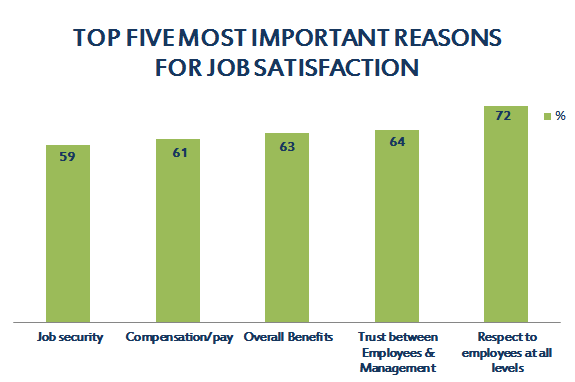HR Today: Towards a Culture of Permissiveness? A Call for Analysis
 |
©AR_HRComatrix_HRAnalysis - Data: SHRM 2015 Satisfaction & Engagement Survey |
From
P
E
R
S
O
N
N
E
L
To
HRM:
a big leap in working conditions' history, and an expanding view of the power of Human
Resources or the average Joe who works for a given company. Where does
the buck stop?
The
answer is simple for the average Joe: Respect, Benefits, Trust, Job
Security, and overall Compensation . That's what the 2015 workforce is
looking for in an employer of choice. Is it an unattainable goal for businesses and HR professionals?
A lot has happened since the Industrial Revolution and the birth and development of Unions, and through the 60's and 70's where women where merely a "commodity" in the business world. Millennials are not even outraged at history: things have changed, it's a fact. And yes, you can say that they have changed quite a bit, for the better in many respects. Things have changed in the world of work to the brink of permissiveness for some workers and employers/managers alike. Today, HR professionals face another array of challenges when it comes to managing the "human" side of HR. We think liability, compliance, metrics, technology, and engagement. An impossible combination? Yet, that's where we stand, at a crossroad of global advancement and diverse interests. What are the stories behind those?
Small Stories, Big Issues
The latest story that crosses my mind this week is the one of the woman who was driven to the "brink of suicide" due to alleged co-workers' behaviors. It is a rather disturbing narrative. It landed in a worker's compensation claim. How could a such situation happen? As the Mormon News Report says in the Cultural Hall Podcast " I shouldn't be that interested in this story, but ...I can't figure out if this is just a toxic work environment with dipsticks, or if this is something that the court might take seriously. Stay tuned...".
Another story was told to me by a rather upset worker in the medical world who recently resigned: According to her, she had given a "fair" warning to her boss that if he ever rehired a specific employee that she found "professionally questionable", she would resign. The former employee was rehired "without her knowledge". She consequently resigned (meaning left a resignation letter and did not come back to the office while she was the person in charge) while her boss was on vacation. Her viewpoint: her boss has been making unethical decisions and does not listen to her. She further went to the police station to complain about not being timely paid (that is immediately upon her boss return) after her exit (you guess right: no positive outcome there). She was ready to go to court and practically spill the beans. She was in retaliation mode.
A third, probably more common story that we HR people ignore or miss (was the hiring supervisor misinformed or the company not up to date on ACA fluctuating changes, or the entity not a ACA-covered one?), is this third one. A worker of a large biotech company resigned because she was offered a full-time position at 32 hours a week, without pay increase or benefits, except a 401K. Her interpretation: "I was asked to just work more and harder with less money. I would have resigned anyway; it just made it easier." How many similar quits do happen? Who is taking the blow: the company or the employee? And sometimes, if not often, there is more than the eye can see, In any event, another quit, and most certainly added cost in such a high-end industry.
No less relevant is the story of the retail environment with its skyrocketing TO of 5-6% a month. That is a national average of 60%, with an average replacement cost of $3,400 per quit. Staggering numbers in a service industry as numbers add up quickly and metrics are based on the quality of service, which in turn, depends on staff availability, reliability, and product knowledge. Pushing on unattainable metrics on a staff pressured by an increasingly insecure working conditions due to "flexibility," which in turn generates involuntary part-timers (have you visited my previous post?), is just a way of alleviating the situation. It is vicious circle. That industry is struggling in trying to balance its evolving scorecard. Today's metrics have to take more into account "expanded" and more global criteria and have to balance "planet, people and profit." Businesses have prioritized soft skills such as engagement. One small issue however: coaching and engagement initiatives can also only be effective if coaches believe in, and understand the core issues.
Key Issues and Survey Results: A Match
Looking at the recently-released SHRM survey on job satisfaction and engagement, we can find an exact match on the reasons behind the small (negligible?) 14% of unsatisfied workers. Negligible indeed: we do not focus on the small numbers, much less on the negative aspects of things. That is the first-hand HR approach: "go positive, ignore it, there is bigger fish to fry", let alone that we are buried under regulations and reports. Stark contrast with the upper tier strategic HR which is struggling in finding the causes of core issues. Maybe I should correct myself: basic data are supplied by first-tier HR. Would big data correct the error supply? That is another story.
 |
©AR_HRComatrix_HRAnalysis - Data: SHRM 2015 Satisfaction & Engagement Survey |
En Synthèse...
De plus en plus, il y a dichotomie en DRH entre ce qui se passe au bas et en haut de l’échelle RH. Doit-on s'en étonner?
Selon la toute dernière enquête RH par Deloitte plus de 80% des RH admettent ne pas avoir suffisament de capacite d'analyse. Au moins, ils le reconnaissent! Tout de même, je crois qu'il faut nuancer entre la capacité d'analyse telle quelle et la capacité à utiliser les methodes analytiques et quantitatives.
Toujours est-il qu'il semblerait que les RH soient très limités dans leur capacité de collecter les données. Quid de l’interprétation alors?
Ceci dit, je pense aussi néanmoins qu'il y a une différence majeure en termes de RH sur le plan global. Par exemple, aux USA, l'aspect juridique et légal a un poids immense. Il semblerait que ce soit la bête noire des Sociétés aux USA. Ayant dû apprendre la législation du travail dans trois pays différents pour pouvoir pratiquer, je peux dire que celle des USA me semble plutôt prépondérante dans toutes les décisions à prendre et ne pas prendre en termes de RH.
C'est à la fois exaspérant et parfois frisant le ridicule de voir et entendre des employés se plaindre de bien de choses que l'on trouverait futiles dans d'autres pays du monde (du genre "il fait trop chaud ici! Je vais porter plainte". Oh! J'ai vu ça, croyez-moi, et l’Établissement de devoir presto acheter des ventilateurs pour mettre sur tous les coins et de fournir de l'eau en bouteille et des sucettes glacées!
Ou encore le cas de cette employée-chef de bureau qui quitte sans préavis après avoir appris qu'une employée "manquant de sens éthique" (selon ses dires) a été réembauchée par le patron sans son accord.
Ou encore cette terrible histoire de harassement d'une personne "religieuse".
Ou encore, la réduction du travail plein temps à bien moins de 35h par bon nombre d'entreprises suite aux 30h/semaine définies sous la reforme de la politique d'assurance sante. Les entreprises coupent là ou ils peuvent et les employés filent tant qu'ils peuvent. (avez-vous lu mon billet précédent? ). C'est presque du "sauve qui peut".
L'on se demande dans quelle mesure la permissivité existe, que ce soit de la part des employés ou des entreprises. Pour certains, la DRH c'est savoir naviguer sur un bateau houleux, l'essentiel est que l'on soit sauf, parfois peu importent les moyens...J’exagère peut-être...?
Toujours est-il que la dernière enquête de la Société Professionnelle HR (SHRM) révèle qu'un nombre minime (14%) des employés ne sont pas satisfaits. Bien sur, en tant que RH l'on se doit d'insister sur le positif. Je me demande si l'on n'a pas tendance à négliger, sinon sous-estimer, le négatif. Mais observer le négatif pour obtenir de bons résultats serait une pratique sage. Ce serait analyser les situations pour arriver à des conclusions valides, basées sur des données objectives. L'on n'a pas besoin d’être un data scientist pour y arriver. Par contre, l'on peut et doit travailler avec eux. Ce qu'il nous faut, à nous RH, c'est de comprendre qu'il est plus que temps de nous reinventer, de nous débarraser des peaux de Dinosaures comme dirait Andrée Laforge, et d'adopter une méthode plus analytique, plus objective, et certainement plus rentable.






Comments
Post a Comment